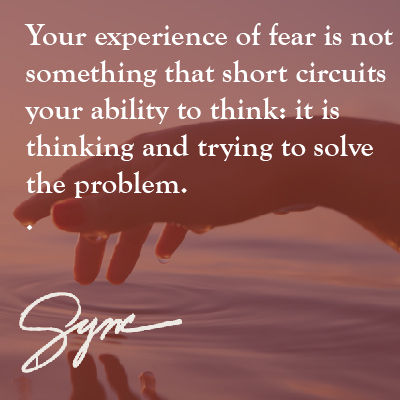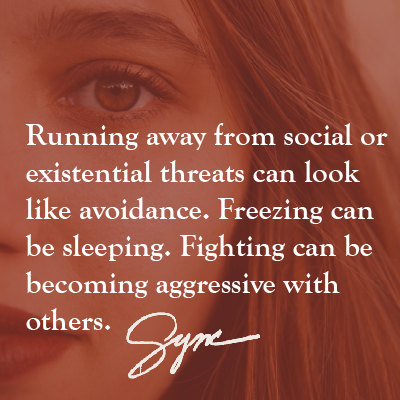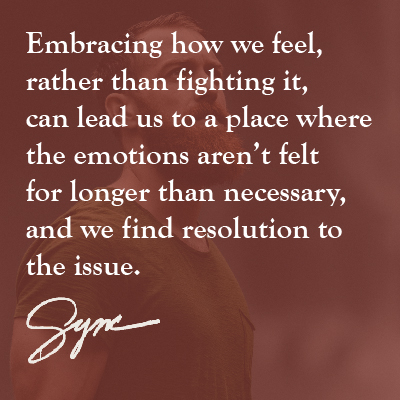
A Clinical Psychologist explains how overwhelming feelings like Anxiety or Fear work
In this post, Clinical Psychologist Christopher Nahumck explains the natural mechanics behind overwhelming feelings like Anxiety or Fear, how these emotions often hijack us, and what you can do to take control.
Christopher Nahumck is a licensed Clinical Psychologist based in Sierra Madre. You can learn more about the work Christopher does here.
All of us have experienced overwhelming feeling at some point in our lives.
Some emotions are good. Like when you accomplish an important task (graduating from college, your first big bonus, getting married or having a child).
Other times feelings are overwhelming and filled with negativity. Like fear or doubt (getting fired, getting pulled over for speeding, getting married or having a child).
Big emotions often feel like they rule us. They feel like they take all the oxygen out of our ability to think about and deal with the situation at hand.
Oftentimes, the immensity of the feeling can lead to more negative emotions. Fear can lead to doubt, which can lead to shame and guilt, which cause us to act in ways that we then regret or deny or lash out in anger about.

Big feelings and emotions often feel like they short circuit our ability to be rational. We look back in hindsight and think “I know I could have handled that differently,” or “I know better than this.” In this article I will explain why these emotions often hijack us, and what you can do to take control.
We often think of emotions as things that get in the way of thinking, especially rational thinking. I don’t believe that is an accurate view.
If instead we look at emotions as non-rational ways of thinking it provides us with a different way to both understand and utilize our emotions so that they are working for us, rather than us working for them.
How do overwhelming feelings work?
Let’s focus in on one of the most distressing emotions: fear, anxiety, or nervousness. All animals experience fear. In the brain there is a specific pathway that deals with fear: the limbic system. Within the brain, the amygdale is activated by fear controls responses to it, and the hippocampus works to store memories and is connected to the amygdale and allows us to learn what to fear and what not to.
It’s more complicated than this, but for our purposes we don’t need to go any deeper than this to understand how fear works functionally.
Any animal that has this pathway will experience fear. This pathway is called the limbic system or the hind brain. It’s also known as the lizard brain, because it is that old. Lizards, birds and mammals all share this brain structure, ensuring that all these animals feel fear.
Why is fear important? It keeps us alive. We learn what to fear because we are trying to stay alert and alive. Imagine you are an animal living on a grassy plain. You’re enjoying your time with the herd, and suddenly you notice something. You get startled and feel fear.
Certain things happen in your body to help you respond. Your heart beats faster and you take faster and deeper breaths. Your blood pressure goes up to ensure the blood travels faster around your body and takes the adrenaline that you feel in the pit of your stomach (or stomachs depending on what animal you are) floods your body and prepares you to respond. You may void your bowels and bladder. Your metabolism slows and your immune system is down regulated.
All these things happen in the moment to deal with the immediate threat of what you assume to be a predator. What matters is survival, and these changes allow you to do one of three things in the time before the predator strikes. You can run, you can fight, or you can freeze. The animal does this quickly and either lives to the next day or is taken down.
The process that is at work in animals is also at work in us.
How is fear and anxiety different in humans?
If reading the above sounds familiar, then congratulations! You are human, and feel fear or anxiety like anyone else. What makes us different than other animals is the sources that produce fear within us. Because we share the same pathway, the effects are the same. However, because our brains are more complex, the things that trigger fear are often more than simply physical threats.
We also fear social and existential threats. Social threats are anything that threatens our standing in our group (whether that is our family of origin, our workplace, our community, or all of Twitter). Existential threats are anything that deals with big intense eternal things like what our life will turn out to be or whether or not a career choice will make us happy.
While a lizard isn’t thinking about what its life will be like if it tweets the wrong thing about the wrong person at the wrong time, we humans often do. Your body experiences this anxiety the same way.

Worrying about the job you lost, or whether you will be a good parent impacts you the same way as if you stepped outside and were facing down a bear or a rattlesnake. Your experience of fear is not something that short circuits your ability to think: it is thinking and trying to solve the problem.
How should you manage overwhelming feelings like Anxiety and Fear?
Start with how you feel.
Anxiety in the moment is trying to get you to do several things. It may feel like you cannot think in these moments. However you are thinking in non-rational ways. The process that anxiety is having you go through is trying to help you. It’s trying to give you with a clear path forward for you. If you know the process, you can use it to your advantage and have a choice as to your responses, rather than feeling out of control.
First, fear tells you that there is a threat, and it sharpens your senses to help you identify that threat. Find the lion. Figure out what the source of the anxiety is so that you can correctly respond to it.
Second, fear primes your body to respond. We think of this as the fight or flight response, but we leave out the third component of freeze. Freezing doesn’t make sense to us, because we don’t have camouflage skin or scales or feathers. If you are being mugged in a dark alley, quiet compliance won’t prevent the robbery, but it allows a much lower the chance of you being seriously hurt than if you try to fight the mugger or run away.

Running away from social or existential threats can look like avoidance. Freezing can be sleeping. Fighting can be becoming aggressive with others. When you understand the process you can create a space where you can choose an appropriate response.
Becoming argumentative with your spouse is not likely to save the relationship if you fear it is over. Avoiding studying for the test doesn’t make the test not happen. Choice allows us to control our response and work with the emotion.
Sometimes, we can’t deal with the source of our fear. I’ve had important tests that couldn’t be avoided. When the anxiety became too much, I’d go work out to give my body what it wanted. A quick run or some weights at the gym would be the equivalent of fighting or flight. After that I was able to return to focusing on studying.
Work with the overwhelming feelings, not against them
If you can start with how you feel, you can work with your emotions to find the solutions. They are trying to help you.

Sometimes the bigness of the emotion is a sign of the importance of the situation. Embracing how we feel, rather than fighting it, can lead us to a place where the emotions aren’t felt for longer than necessary, and we find resolution to the issue.
It’s not easy in the moment, but with practice we can create enough space to choose our response, and increase our sense of control. Our emotions are trying to help us, if we can learn to listen.
Need some guidance in managing overwhelming feelings?
I’m a psychologist who focuses on connecting with you in order to help you become the person you want to be. To open you up to your full potential and full authentic connection with the people in your life who matter most. Being deeply known by another allows us all to better see what we miss in ourselves and to move from a life that is isolated, unfulfilled, and empty into a life of authenticity, vibrancy, and abundance. You can connect with me here.
Looking for the best therapists or counselors in your area?
There are good therapists or counselors in the Sync community in Pasadena, Sierra Madre, Downtown Los Angeles, Santa Monica, and Burbank.
